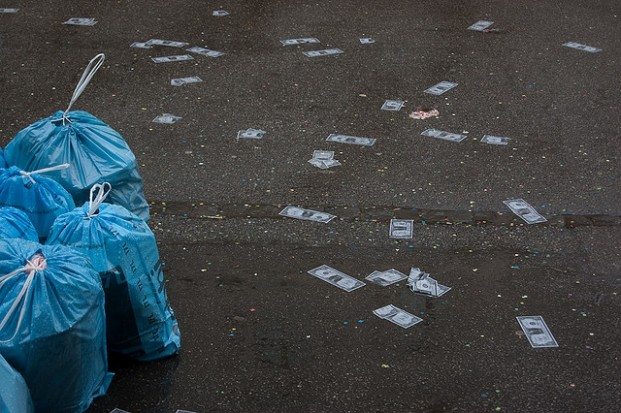Is It True That Poor People Just Waste Thier Welfare Money
Even those with strong money management skills sometimes waste money or pay more for things than they should. Not all wasted money is in the form of eating in restaurants every night or getting a coffee on the way to work, although those are generally the easiest money leaks to recognize and fix. There are other situations where money may be wasted that aren't quite so obvious. Here are five ways you may be wasting money and how you can reduce the waste:

1. Insurance Deductibles
An insurance deductible is the amount of money you have to pay before your insurance coverage starts covering the claim. Many people carry lower deductibles on their insurance policies so they can pay less if they need to put in a claim. A better strategy may be to increase your insurance deductibles and keep enough money to pay the higher deductible in an accessible account in case you need to put in a claim. The higher your insurance deductible, the lower your insurance premium, and since you only pay the deductible when you actually make a claim– it often makes more sense to have a higher deductible and lower premium. For car insurance premiums, people can save anywhere from 10% to 40% on premiums just by increasing the deductible from $250 to either $500 or $1,000.
Homeowners insurance works the same way: the higher your deductible, the lower your premium. Raise your homeowner's insurance deductible from $250 to $1,000 and save about 24% annually; raise it to $2,500 and save about 30% annually.
This may not be a good money saving strategy for someone with little money in savings, or someone who puts in claims and pays their deductible often.
2. Snow Removal Tools
If you live in an area that experience three months with possible snow storms per year, do you really need to invest $1,200 on a top-of-the-line snow blower? It will sit in your garage or shed the rest of the year. These machines have engines and need to be maintained over time, too. A better idea may be to split the cost of a snow blower with a couple of your neighbors, and allow everyone to use it to clear their driveways and sidewalks, or to simply pay someone for snow removal if it's needed infrequently.
3. Avoidable Fees
There are some fees you have no choice but to pay for, but there are even more that you can completely avoid if you make a conscious effort. Do you find yourself forgetting to pay bills? Maybe you get so involved in work or projects and you just can't remember if you paid all of your bills or not. Those late fees really add up. Avoid them by paying all of your bills at once on the same day each month; or setting up auto pay with your bank so everything is paid automatically on the dates you choose. Another option is to set reminders on your phone or through a calendar you use – just to make sure it doesn't slip your mind when you get busy with other things in life.
At the same time, overdraft fees are ridiculously expensive and can quickly snowball out of control if you make a mistake with your finances. Keep a cushion of extra money in your checking account to take care of small mistakes that would otherwise cause an overdraft; or switch to a bank that offers a line of credit on overdrawn items so you can quickly pay the difference and avoid paying an overdraft on each transaction. Avoid other bank fees by understanding how long it takes your bank to make each type of deposit available (so you don't use it before it's actually in your account); using free ATMs or limiting ATM use that will result in a fee; and choosing bank accounts with no monthly fees.
4. Fancy Clothes You're Going to Wear Once
Most people don't want to wear their favorite pair of jeans in their wedding or to the prom, but why spend a few hundred dollars on a dress or tuxedo you are only going to wear one time and then hang it in your closet? You can rent clothing for special events for about $50 to $60 – or you could find something nice to buy secondhand and save, too.
5. Paying Off Low Interest Debts Before Higher Interest Investing
For most people with debts, the best strategy for saving money is to pay them off as soon as possible to avoid paying more interest. What you should consider, however, is the strategy of allocating money so that you maximize its potential. For example, if you have a loan with 3% interest but you can make 8% on money in a mutual fund – it may not be the best use of extra money to pay your loan off early. On the other hand, if you have a savings account with a balance earning 2% interest but have credit card debts accruing interest at 15% or more – you need to pay off the credit cards rather than leave the money in the savings account.
Is It True That Poor People Just Waste Thier Welfare Money
Source: https://www.mybanktracker.com/blog/find-my-answers/5-dumb-ways-wasting-money-109749
Posted by: blackpereve.blogspot.com

0 Response to "Is It True That Poor People Just Waste Thier Welfare Money"
Post a Comment